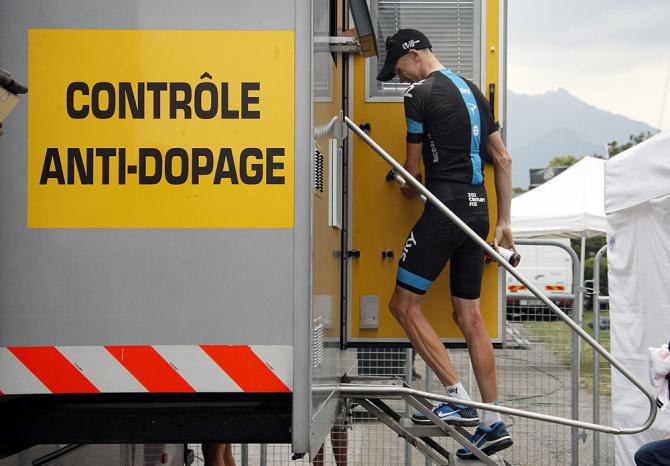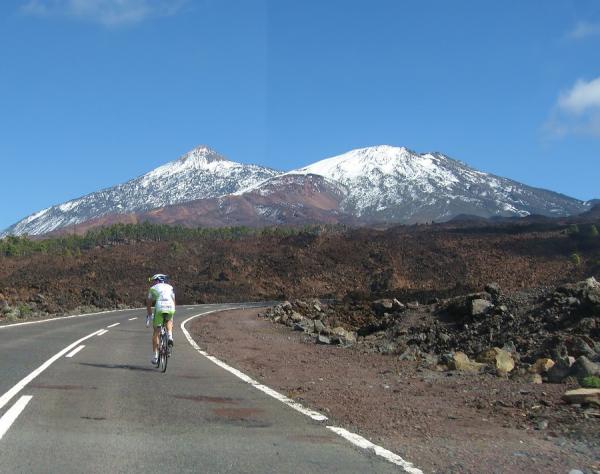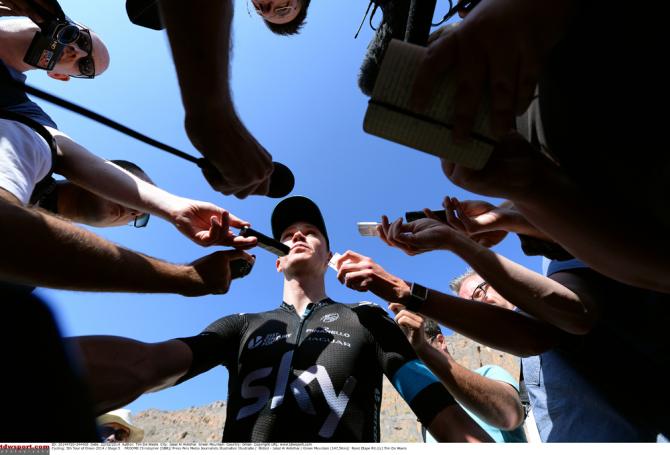Lack of anti-doping testing in Tenerife under spotlight
UCI claims tests were done; Sky, Astana had none



Anti-doping tests in Tenerife have again come under the spotlight after two of the world's biggest teams confirmed that none of their athletes were tested during several training camps on the Spanish island, but the UCI claims that its anti-doping affiliate, the CADF, carried out controls on "top tier teams" on the island this season.
Both Team Sky and Astana spent several weeks at altitude on the island as they trained ahead of major objectives during the season, including the Giro d'Italia and Tour de France. Cyclingnews had approached three of the world's biggest teams in an attempt to follow up on claims made by Chris Froome earlier this year in which the former Tour winner stated that he and several riders had not been tested in Tenerife.
This year, Team Sky were in Tenerife from April 7-20, and again from May 16-28. The team told Cyclingnews that no tests were carried out at either camps and the team confirmed that roughly six to ten riders attended each camp. The team confirmed that, "we've always been a strong supporter of rigorous testing both in and out of competition."
Astana responded and confirmed that they had organised three camps in Tenerife during the season. Dates were not provided but the camps were listed as the "Ardennes Camp", "Giro Camp" and "Tour Camp." No tests were carried out by the UCI at any point.
Cyclingnews also approached Tinkoff Saxo. The Russian team spent time in Tenerife as they trained ahead of the Tour de France. The squad would not confirm if they had been tested during their training camps in Tenerife, instead choosing to push the focus back on the UCI. The Russian team did however release the following statement to Cyclingnews.
"All Tinkoff-Saxo riders strictly adhere to the rules of the Whereabouts Program, with no exception whatsoever. Their accurate and updated location information is available to all relevant organizations and authorities that can carry out all the appropriate testing, whenever they deem it appropriate. We do not think that it is up to the teams to speculate on where and when tests are carried out nor why they are not in certain occasions."
One rider on a major WorldTour team, who wanted to remain anonymous, told Cyclingnews that he spent four weeks in Tenerife during the entire season and didn't have a single anti-doping test. He was tested in the location once in 2013.
The latest race content, interviews, features, reviews and expert buying guides, direct to your inbox!
Back in June, when Froome first raised a possible issue over a lack of testing, the UCI responded by saying they would investigate the matter. At the time a spokesperson for the governing body told the BBC that "We're looking into the matter with the Cycling Anti-Doping Foundation."
Several months on and Cyclingnews approached the UCI, asking if they could confirm if tests had been carried out in Tenerife this year. They responded by saying that, "the efficiency of any anti-doping testing strategy relies on the unpredictable nature of the testing location and the element of surprise. Therefore, it is in no one's interest that the UCI and/or the CADF communicate on the number of tests carried out in specific regions."
When asked if they had carried out a single test in Tenerife this year, they responded with the following: "this question would mean revealing part of our anti-doping testing strategy."
When Cyclingnews contacted the UCI for a third time to confirm that both Astana and Team Sky were not tested in Tenerife they replied, and eventually confirmed that some tests had been carried out on the island. However they would not specify which teams, how many controls were taken or why Team Sky and Astana were not tested.
"Without going into details, we confirm that the CADF carried out tests on top tier teams in Tenerife in 2014."
"The strategy of targeted testing is the backbone of the 2015 Anti-Doping Code set by the World Anti-Doping Agency (WADA). The UCI is making the necessary changes to its policies, structures and procedures in order to ensure compliance with this Code. Part of this strategy is based on an increased cooperation with National Anti-Doping Organisations (NADOs) in the field of information sharing and testing operations.
"In line with their qualitative approach, the CADF, on behalf of the UCI, is committed to carrying out tests wherever and whenever needed."
Does a lack of Tenerife testing matter?
Robin Parisotto is a leading anti-doping expert and is part of the UCI's panel which examines passport cases. Based in Australia, he has also worked with the Russian anti-doping federation. Although Parisotto is not privy to the UCI's testing strategy – he analyses anonymous data – he laid out a balanced case over the Tenerife situation.
"In terms of the passport I don't think you're going to miss that much in a two-week camp because the benefit you want is for competition and not for training," he told Cyclingnews.
"In the old days of systematic doping teams used to dope while training in the hope that they could reach that level again in competition but without doping. That worked when the sport was uncontrolled. The passport hasn't wiped that out but it has made it a lot harder to get a benefit from doping and trying to hide it at the same time."
The UCI's testing policy in one location does create a potential scenario from which questions over the credibility of performance can thrive. When Froome first raised the issue over a lack of testing it was partly in order to highlight an issue over the image of cycling and the sport's credibility. He, along with Vincenzo Nibali and Alberto Contador would line up as Tour de France contenders in July and spearhead the challenges at Team Sky, Astana and Tinkoff, respectively. Froome was under no illusion that whoever came out on top – and it was eventually Nibali – would face questions over doping and testing.
In June Froome told Cyclingnews that "Alberto, Vincenzo, we're all up here with our respective teams and at the end of the day we're the ones that have to stand in front of the television cameras in July and justify performances. All three of us are GC contenders and the probability is that whoever is in the yellow jersey in July is going to have to answer questions and if we're not getting tested that doesn't look good on any of us."
Parisotto added that such gaps in testing could provide athletes with the option to micro-dose EPO, however he added that the biological passport also had the ability to pick up where urine tests may falter.
"The half-life is a matter of days but it comes down to strategy and what intelligence the UCI has so they have to weigh up the pros and cons. It could be that they're being more strategic and that they're thinking about the economics of it as well. In some sports certain athletes will go training to the most obscure places in the world in order get away from the testers but in saying that Tenerife isn't that far out of the way."
"If you're micro dosing then it's going to be out of your system within a day or two. A urine test would be pointless, almost. That's where the passport comes into play because those markers can be affected downstream, days or weeks later."
"In terms of following riders to the ends of the earth to a cycling camp, I'm not too perturbed by that because I know that down the track the passport will show up something."
The passport itself has faced questions in recent years. Biological passport expert Michael Ashenden previously raised the issue over gaps in testing data, while the recent and ongoing case surrounding Roman Kreuziger highlights the battles over the interpretation of blood values and the length of procedure involved in case. Parisotto admits that the Passport is not perfect but that as a tool in the fight against doping, it stands up.
"While the passport is not fool-proof what it has done is make it much harder to blood dope without making noticeable changes to blood parameters - even the contemporary practice of micro-doping will inevitably leave tell-tale signs somewhere down the line. I could mention what specific patterns experts look for when considering micro-doping but that would be giving the game away. Suffice to say that if blood parameters are not significantly altered then what real benefit is being perceived by the athlete in any case? After-all the fundamental objective of blood doping is to increase haemoglobin levels in order to facilitate increased oxygen carrying capacity."
"Having said that, it would be good if athletes and teams felt there was a real threat of being tested at any time, or anywhere in the world. That to me is the draw back from the news that certain camps weren't being tested but they must have reasons for that strategy. I'm sure that there are still riders out there micro-dosing still and they're covering their tracks quite well but at some stage they will slip up. "
Tenerife and cost
Funding could well be an issue when it comes to explaining any perceived gap in testing. In order to test riders in Tenerife anti-doping authorities may well need to send a pool of testers to a location that's relatively remote. There's also the added pressure of needing to transfer the samples to the accredited lab in Madrid within a certain time frame.
Cyclingnews spoke to one source who has extensive knowledge of how the UCI's Passport programme operates and its funding. "There's no real excuse for this. Wherever athletes are they need to be tested, training camp or not. Yes, it's an expensive operation to send testers to such logistically difficult areas but finance shouldn't be a deciding factor if we want a cleaner sport. To me, and from what I know from working in the sport, there's no excuse if two or three Grand Tour favourites are spending extended periods of time there in the lead up to the Tour de France."
Daniel Benson was the Editor in Chief at Cyclingnews.com between 2008 and 2022. Based in the UK, he joined the Cyclingnews team in 2008 as the site's first UK-based Managing Editor. In that time, he reported on over a dozen editions of the Tour de France, several World Championships, the Tour Down Under, Spring Classics, and the London 2012 Olympic Games. With the help of the excellent editorial team, he ran the coverage on Cyclingnews and has interviewed leading figures in the sport including UCI Presidents and Tour de France winners.
